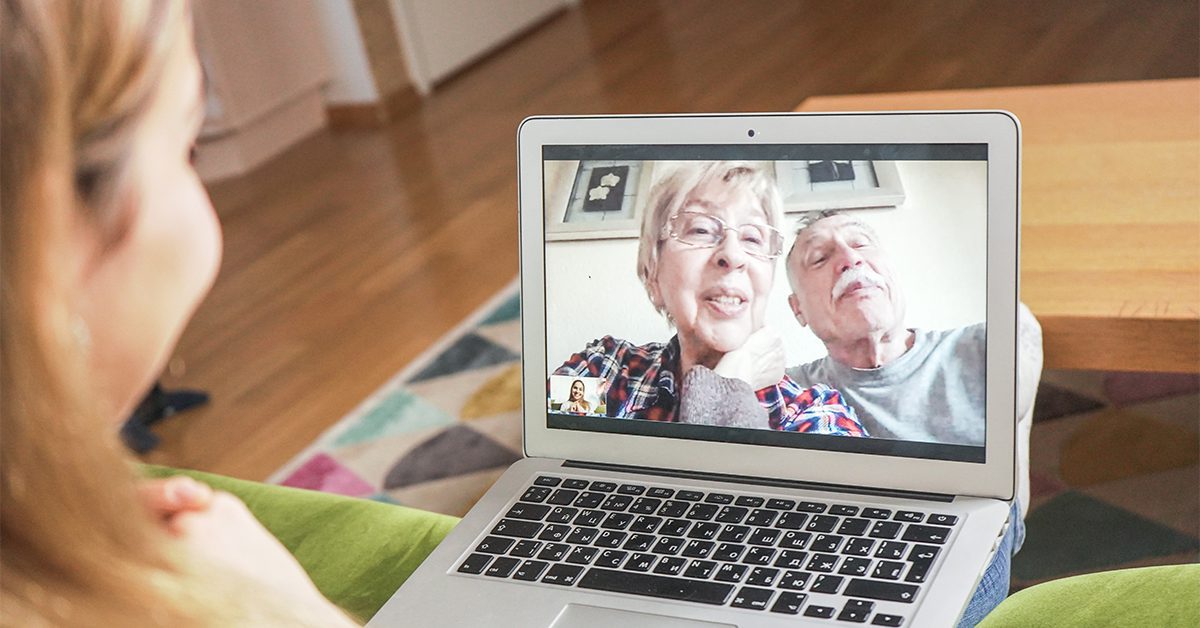
Detecting Dementia in Loved Ones from a Distance
Seeing loved ones in person was difficult for many throughout 2020 and will continue to be a challenge well into 2021.
This isolation puts additional strain on older people who are at higher risk of loneliness even prior to the COVID-19 pandemic. It also puts a strain on adult children who are concerned about the mental state of their parents. Without regular in-person contact, it can be difficult to pick up on the early warning signs of dementia and Alzheimer’s disease.
Here are suggestions for spotting signs of mental decline and dementia in faraway senior family members and what to do about it.
Check in virtually.
Nothing replaces being in the same room with a loved one, but using apps like Zoom, Skype, and FaceTime can help you stay connected to seniors in your life and keep tabs on their mental state. Simple conversations will reveal if they’re staying sharp or if their mental state is in decline. If using a video conference app isn’t possible, then even a phone call can reveal a lot about the mental health of your loved ones.
Notice their appearance.
As you have a conversation, take note of clothes, their hair, and overall appearance. Does it seem like they are bathing and grooming themselves daily? Are they changing their outfits day to day? If not, this can be a sign of mental decline or depression.
Also, take note if they seem to be losing weight. Those in the early stages of dementia can actually forget to eat regular meals.
Look for background clues.
Of course, you want to focus on your conversation with your parent but try to also notice what’s in the background as well. Are beds unmade? Are dirty dishes piling up in the kitchen sink? Are there stacks of unopened mail? If your loved one’s usually orderly home starts to look disheveled, then they may be forgetting to take care of these daily tasks, which can be a sign of cognitive issues.
Ask about hobbies.
Think about what your parent likes to do in their free time, then strike up a conversation about it. Ask about good books they’re reading or the progress of knitting projects. Are they playing the piano as often as they used to? If your parent’s mental state has declined, or the isolation is leaving them a little depressed, one common symptom is that they may have stopped pursuing their favorite activities.
Chat with, and without, the kids around.
Seeing their grandchildren, even on screen, will certainly improve the mood of any grandparent. However, understand that your parents may be reluctant to talk about certain topics in front of the kids—especially their health. Make sure you spend some time speaking without the kids around. They may be more willing to open up.
Have a caring conversation.
Ask open-ended questions about your parent’s daily life. What have you been doing with your day? Who else have you talked to lately? These questions will start an organic conversation that will give you important clues about the state of your parent’s mental health. However, you want to avoid asking direct questions like a drill sergeant, such as: Have you eaten today? Did you take your meds? When did you last see the doctor? This may make your parent feel like a child, and they may shut down rather than open up, or avoid talking to you as often as you’d like to.
Identify resources in your parent’s area.
Learn about what resources are available where your parent lives. You can do this by talking to local medical professionals, or simply finding a caregiver support group who has access to professionals and services local to your area.
Whether you live far from your senior parents, or you are just unable to see them in person because of the COVID-19 pandemic, you can be actively involved in assessing their mental state and getting them help when needed. and take on meaningful roles in helping out. Don’t underestimate the importance of supporting your family from a distance.
Archer Law Office Can Help
For More Information Contact this office (609) 842-9200

My husband and I are going to need help. We are both healthy and active and are children would like to move us to a nursing home which we definitely do not want to go to. If you visit with us you will see what I say is true.
I am a professional artist who will be having a big exhibit at the Trenton City Museum in March. My husband is in good health and is very active physically and takes care of our large property and house.
Neither one of us want to go into a nursing home. We are quite capable of taking care of ourselves.